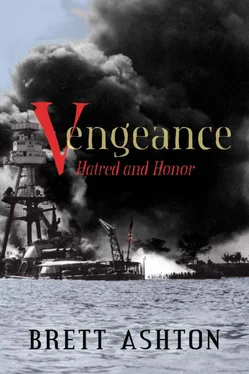I smiled back at the chief and told him, “Thanks for your concern, chief, but I think it is a lot safer now than it was the last time I was on her.”
Kindly returning the smile, the chief replied, “I understand sir. I only mean to say it’s not going to be what you expect it to be.”
I turned around, crossed the plank, and stepped onto my old ship.
The teak deck was beginning to decay from neglect and having been submerged in warm salt water for the period of time she had lain upside-down on the floor of Pearl Harbor. Parts of it were missing entirely. All around was evidence of the yard crews with their cutting torches spattered on the deck with careless disregard for the condition of the ship. The tripod mast towers and superstructure, which had once so gracefully distinguished this once-proud ship, were gone entirely. Most of the topside hatches had either been removed or left open to expose the interior of the hull to the elements. Even as I surveyed the damage, I began to feel myself sinking into a state of reverie as I began to remember this ship as she was only a few short years ago. Almost unaware of it, I had stopped moving.
“Where was it you wanted to go, captain?” the chief gently asked.
Even in spite of the gentleness of his question, I jumped, startled by his question. “To the officer’s berthing quarters,” I quietly replied.
The chief led me forward to where the hatches that led to the interior of the ship used to be. Down the ladder we went, into the darkness below.
An eerie silence pervaded the ship, which seemed to press in all around me. It was strange, as if the ghosts of my departed crewmates were following me as I moved from compartment to compartment and through the passageways that connected them. I could see with my eyes the depth of the destruction inflicted by the Japanese in the attack, but with my mind, I saw the ship as she was when she was alive. I could hear the boilers, generators, and ventilation blowers, which you become so used to living on a ship, and yet my ears and nose perceived nothing but the stale, dead air, filled with the stench of death, war, and silence.
Normally, any other person would not have gone past that point, being overwhelmed by it, but I was driven almost by some invisible force to continue on.
We took the short passageway aft and entered the officer’s wardroom. It was in this room where I was eating bacon and scrambled eggs and drinking coffee served to me by our young Ensign Flaherty. Francis, who died in the attack, was later awarded the Medal of Honor for saving the lives of so many of the crew.
I realized I had been so busy fighting the Japs since then that I had almost forgotten him.
The officer’s wardroom always had an air of elegance about it. China plates as opposed to the metal trays the enlisted crew ate off of. The sturdy tables were always covered with decorated tablecloths. Pictures of the ship and the exotic places she had been adorned the walls and mess attendants—like waiters—were always there to serve your every need. It was a lot like going to a restaurant.
There was neither coffee now, nor bacon or eggs. And any pretense of the once-glamorous—for a battleship, anyway—nature of the compartment was gone. Broken dishes, utensils, chairs, and tables were sloppily thrown out of the way in the corner. Everything was covered with oil. Nothing was spared because nothing was sacred.
We proceeded aft down the very same passageway I ran through after the first torpedoes struck the ship. I wondered again what it was I hit my head on in the darkness during the attack and began to rub my aching head. “Maybe it’s the smell of the fuel oil making my head hurt,” I said to the chief.
“Maybe,” he replied.
We moved on aft around the turrets and came to the ladder that led both up to the main deck and down to the officer’s quarters where I was berthed. It was the same ladder where I had helped the injured crewman up out of the ship before. This time, we went down and found ourselves in the compartment where I used to live as a member of this ship’s crew.
The compartment had been pumped out, and any linen was removed to prevent mold but otherwise had been left alone. Everything was in disarray, but the lockers, being bolted to the floor, were still intact. Several of the lockers had been cut open, possibly by some of the officers I used to share this room with. I found mine, and the chief produced a set of bolt cutters from the toolbox he carried with him and snapped the rusted lock off of it.
I opened it up, prying the door with some force to break the rusty hinges. Inside were my old uniforms in total disarray and covered with oil. Letters from my wife in a box were covered with mold, and the ink no longer was legible from being submerged in salt water for so long. My rank insignia, medals, the last trophy I had won in the ship’s shooting team, and most of the very few trinkets we were allowed to bring aboard ship were right where I had left them, except they had been carelessly flipped over, then flipped back.
I spent the better part of an hour going through my old things, trying to find something to salvage, but there was nothing that was worth anything to me except for the medals and the trophy. Most of the contents were barely recognizable, let alone usable. On cue, the chief produced a bag from his tool box to put my effects in and asked if there was anything else I wanted to see while I was there.
“Yes there is, chief. I need to go to the armory.”
And so we wound our way through the darkened passages of the dead ship up and down several decks in a way I wouldn’t have gone before. The chief explained that, due to the damage to the ship, several passageways were no longer accessible the way they used to be. Some of the bulkheads and hatches were moved to facilitate the installation of the patches that were keeping the ship afloat, particularly on the port side.
I couldn’t help but think of the attack, when I made my run down the port side of the ship, ordering as many of the crew as I could to abandon ship.
On the way, we passed the turret where Ensign Flaherty was last seen by Lieutenant Lewis. I stopped briefly to look in but did not enter it.
Eventually we arrived in the armory. The heavy security door had been removed and was nowhere to be found. Back in the aft part of the room, I found what I was looking for: another small locker used for storing the officer’s sidearms. Captain Bode didn’t allow me to carry my sidearm in those days, and I had no reason to. We were at peace. The sidearm I currently carried was a replacement issued to me after the attack. With patience and practice, I had fine tuned it to shoot nearly as well as the one I was currently looking for.
The chief had a little more trouble with the door to this locker than he did with my own locker, but soon enough, we were inside. The handguns inside had all been spilled off of their racks when the ship rolled over and were in a pile in the bottom of the locker. I kept mine separate in its own box, which I found after a brief search. I wiped the nameplate off with the sleeve of my coveralls and read “LCDR Jacob Williams.”
“Lieutenant commander to captain in this time? That’s a pretty good advancement, sir,” the chief said. I just simply nodded in reply and opened the box.
I knew from the condition of the other guns in the locker what I would find. My prize-winning Colt forty-five had rusted solid. Only the pearl grips remained intact, and with a little bit of effort, they began to shine through the grime. My name, which had been engraved in the slide, along with the designs that had surrounded it, had all but rusted off.
Susan had been so very furious when she found out how much money I had spent having this gun engraved like that. And parts of it were even plated with gold. I’d spent nearly a whole paycheck as a lieutenant junior grade on it, even during the great depression. She didn’t talk to me for nearly a week.
Читать дальше












